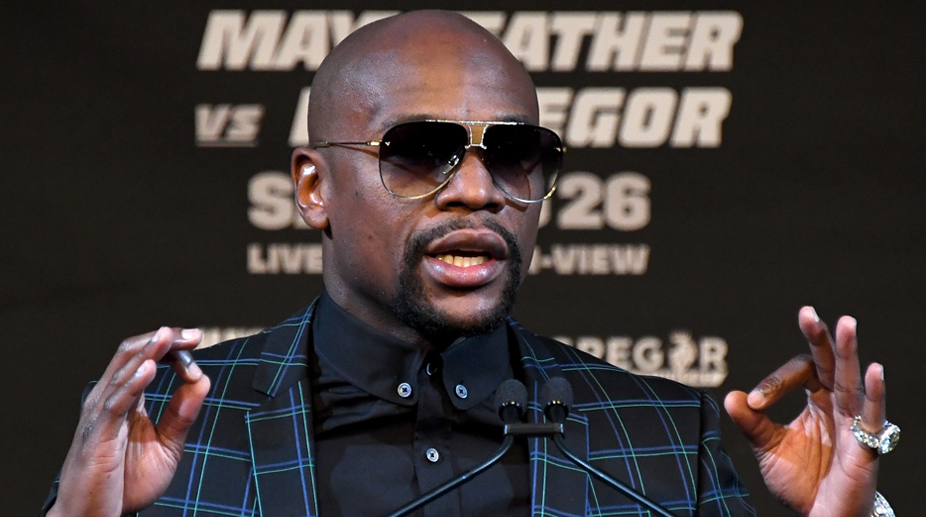Trump makes triumphant return to Madison Sq Garden
US President-elect Donald Trump has made a triumphant return to the Madison Square Garden (MSG) with his entourage of high-level nominees and advisers to watch a mixed martial arts championship.
The 50th bout of Mayweather’s 21-year professional career has been largely been disparaged.

Boxing icon Floyd Mayweather (Photo: AFP)
Two years after retiring from boxing, Floyd Mayweather climbs back into the ring on Saturday chasing history and one last mammoth payday.
The 40-year-old former welterweight champion will become the first boxer in history to post a perfect record of 50-0, if as expected, he proves too strong for Conor McGregor, the mixed martial arts star fighting in his first ever boxing contest.
The 50th bout of Mayweather’s 21-year professional career has been disparaged variously as a freakshow, publicity stunt or simply “bad for boxing.”
Advertisement
Mayweather, who has spent years crafting an image as the fighter that fans love to hate, is not even remotely fazed by the catcalls.
Because not for the first time, the boxer who delights in displaying the trappings of his wealth across social media, will be laughing all the way to the bank.
Mayweather, whose career earnings reportedly topped $700 million following his last bout in 2015, could, according to some estimates, pocket another $200 million this weekend.
It is the latest money-spinning stop on a career that has seen Mayweather go from 1996 Olympics bronze medallist to be regarded as one of the greatest boxers in history.
Born in Grand Rapids, Michigan, on February 4, 1977, Mayweather was destined for the ring.
His father, Floyd Mayweather Sr, was himself a talented former welterweight who once fought 10 rounds with Sugar Ray Leonard. Floyd Sr. taught his son to box almost as soon as he could walk.
Floyd Sr. was holding his infant son in his arms when he was shot in the leg during a family dispute, an injury that effectively ended his career.
“He was training to be a fighter in the crib,” Mayweather Sr. said of his son.
Mayweather, who grew up in a cramped apartment with seven relatives, frames his early life as a battle for survival.
“It’s never been easy for me. Boxing is easy but life has never been easy,” Mayweather says.
“I had a father who was a hustler and a mother who was on drugs. I was the man in the house from 16. That’s just the way it was.”
When Mayweather fought at the 1996 Olympics, his father was serving a five-year prison sentence for drug-trafficking.
In Floyd Sr’s absence, his uncle Roger had taken over the training of the young fighter, overseeing his entry to the professional ranks.
Within two years, the skilful, lightning-fast Mayweather had won his first world title, knocking out the WBC superfeatherweight champion Genaro Hernandez in eight rounds.
Years of domination followed as Mayweather plowed through the divisions up to welterweight.
In 2006, he took the unusual step of buying out his contract with promoter Bob Arum, in order to take greater control of his career.
Since then Mayweather has been able to dictate terms for most of his fights, taking a cut of the back-end profit in exchange for upfront risk.
It means that the dollars have continued to flow in ever-increasing numbers, from $25 million to fight Oscar De La Hoya in 2007 to around $220 million for his 2015 fight against Manny Pacquiao.
But while the dollars have rolled in and the bank balances have swollen, Mayweather has struggled to build up a reserve of public goodwill.
Multiple convictions for domestic violence point to the fighter’s dark side, while in boxing terms he has faced accusations that he ducked his most dangerous opponents, such as Pacquiao, until they were past their peak.
His cagey, cautious style inside the ring, while earning grudging approval from purists, has also frustrated fans hoping to see him take a more aggressive approach.
Mayweather, who insists Saturday’s bout with McGregor will be the last time he ever enters a ring, is unapologetic about the tactics that have guided his career, believing his is a template that many rivals would like to emulate.
“When a person has been so dominant in his era, I think other fighters are going to pay attention,” he told reporters recently.
“The main fighters are going to pay attention because they want to be at my level and they want to do the same thing — they want to dominate with ease.”
Advertisement